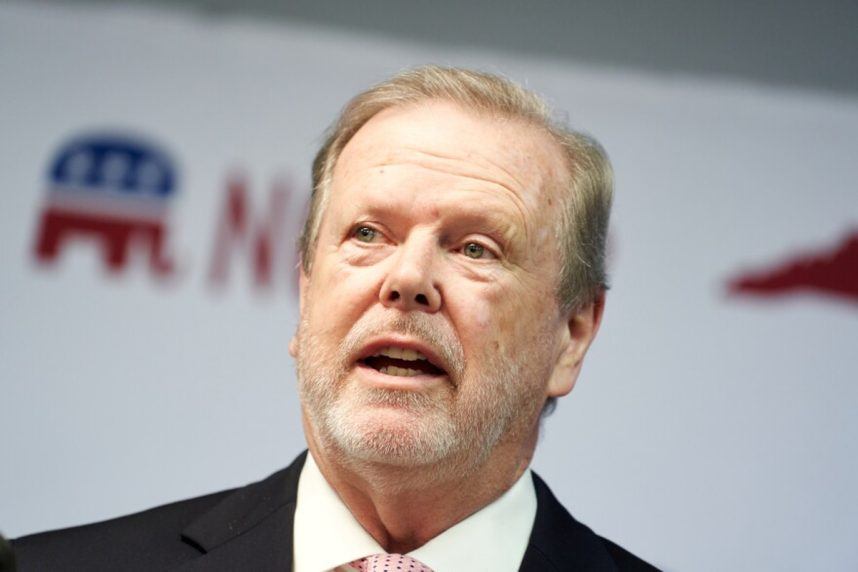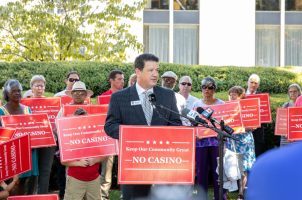North Carolina Counties Say Infrastructure Upgrades Unrelated to Casinos
Posted on: January 8, 2024, 08:24h.
Last updated on: January 8, 2024, 10:18h.
Efforts to legalize casinos in North Carolina didn’t materialize in 2023. But with leaders in the General Assembly suggesting they’ll renew the gaming push this year, there’s rampant speculation about the odds of Las Vegas-style resorts coming to the Tar Heel State.

The public’s opposition to casinos — a study last year concluding that more than three in four North Carolinians oppose gaming expansion — and the unease surrounding the legislative effort to legalize them was recently made apparent by the four counties targeted for casinos receiving state funding for water and sewer infrastructure upgrades. Almost immediately after being allocated state money for the costly projects, rumors surfaced that the infrastructure enhancements were linked to the possible casinos.
Some believe the improvements are to more easily allow such a large-scale resort project to be built in the rural counties of Anson, Nash, and Rockingham. Local leaders, however, have largely dismissed claims that the investments have anything to do with casinos.
Rockingham has been allocated $54.5 million for water and sewer upgrades. Nash is to receive $17 million and Anson is to receive $6 million for wastewater projects.
The money is part of $2 billion in state funding allocated for an array of infrastructure projects statewide.
Casinos Unrelated
Last year, North Carolina Sen. President Pro Tempore Phil Berger (R-Rockingham) pushed legislation to allow a commercial casino resort in the three aforementioned counties. Berger’s bill was developed in conjunction with The Cordish Companies, a Baltimore-based gaming and hospitality firm that runs three casinos in Maryland and Pennsylvania.
Cordish executives have made a series of political contributions to Berger and several other powerful lawmakers in Raleigh.
Berger initially joined House Speaker Tim Moore (R-Cleveland) in supporting the gaming undertaking. But Moore later backtracked his support after saying there wasn’t adequate backing in his chamber. That infuriated Berger, who was looking to provide his home county an economic spark after agreeing to compromise with Gov. Roy Cooper (D) on widening health care access through the state’s “Obamacare” program.
With Berger pledging to reintroduce a gaming bill this session, which begins January 17, county and local leaders say the infrastructure investments have long been in the works.
We’ve had to increase our infrastructure, water, and sewer to accommodate growth,” Lance Metzler, Rockingham county manager, told the Carolina Public Press. Metzler said the investments have been planned “for years.”
North Carolina requires the counties to bankroll their infrastructure projects and then submit invoices for the work performed to be reimbursed.
County Concedes Projects Would Aid Casino
While county leaders in Rockingham and Nash said the investments have nothing to do with gambling, Anson County Manager Leonard Sossamon conceded that the upgrades would allow a casino resort to be more easily constructed.
We don’t have the capacity to support something like a casino site and we want to enhance our water and sewage capacity,” Sossamon said.
Berger said last month that the casinos are much more than just gambling facilities. That’s why he refers to them as “rural entertainment districts.
“If you think it’s only about gaming, you say ‘casinos.’ But it wasn’t only about gaming. It was about addressing economic growth and economic development in rural areas,” Berger told Tim Boyum on his Spectrum News podcast, Tying It Together.
Berger said his fellow lawmakers have done a good job of promoting economic activity in the state’s cities. But “that is not something that has occurred evenly across the state.”
Related News Articles
North Carolina Casino Effort Busts, Budget Moves Forward Sans Gaming
Georgia Lawmaker Pursues Sports Betting, Casinos
Most Popular
Mirage Las Vegas Demolition to Start Next Week, Atrium a Goner
Where All the Mirage Relics Will Go
Most Commented
-
Bally’s Facing Five Months of Daily Demolition for Chicago Casino
— June 18, 2024 — 12 Comments
















No comments yet